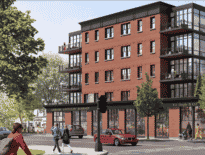A national survey by Zillow suggests a successful COVID-19 vaccine rollout could help ease the inventory crunch blamed for the rapid run-up in home prices.
While only about half of homeowners say they would be more comfortable moving to a new home right now despite the real estate industry’s efforts to convey the safety of the current home-sales process, about 70 percent say they would be game after much of the population gets vaccinated. And among homeowners who said the vaccine would impact their decision to sell, 78 percent said they expect it will make them more likely to move.
The increase, Zillow estimates, would translate to an additional 14 million homes across the country that could come on the market.
Not all of those homes may be located in the suburban neighborhoods that have been the focus of much recent demand as Millennials with young families look for larger homes. The survey found that 25 percent of urban homeowners said widespread vaccination would influence their decision to move, compared to only 9 percent of suburban owners and 7 percent of rural owners, Zillow population scientist Manny Garcia said.
And vaccine distribution appears to be less important to potential move-down and empty-nester buyers: Only 10 percent of Baby Boomer and Silent Generation homeowners said it would impact their decision to move, while 15 percent of Generation X homeowners and 25 percent of Millennial and Generation Z homeowners said the same thing.
In addition to health concerns, the Zillow survey found that homeowners are feeling more certain about their life circumstances and financial situation, with the number who reported things were “too uncertain” declined from 29 percent to 25 percent.
“We expect that the vaccine rollout will likely boost inventory, as sellers become increasingly willing to move despite Covid-19 – resulting in greater numbers of new listings beginning this spring,” Chris Glynn, principal economist at Zillow, said in a statement. “That injection of inventory could give buyers more options and breathing room in a competitive market. The vaccine, however, will also likely add to already-strong demand, given that most sellers will become buyers as they trade in for a home that better suits their new needs.”
Massachusetts only had 3,489 single-family homes for sale and 2,717 condominiums for sale as of Jan. 31, the Massachusetts Association of Realtors reported. Those numbers represent 64 percent and 26.1 percent declines over January 2020, respectively.
New listings are down precipitously across many parts of the state, too, with the number of new single-family homes hitting the market statewide in January down 17.1 percent year-over-year, and down as much as 42.2 percent on Cape Cod.
“Housing at all price points is needed to list for sale and build in today’s market. The biggest hurdle potential sellers are overcoming is where do they move if they sell? Right now, the option for many is to simply leave the Cape. By getting more new housing to the market, we can start to unclog the bottleneck. This is not going to be easy or quick to recover from an inventory shortage squeezing prices higher,” Ryan Castle, CEO of the Cape Cod and Islands Association of Realtors, said in a statement announcing the release of the association’s January market report. “Those getting squeezed out of housing in today’s market are those who traditionally could afford to buy on Cape Cod. They simply can’t compete with the addition of a new demographic of buyers who are looking towards the Cape as a result of the pandemic. We need to incentivize the creation of market rate middle income housing construction that is elusive to build due to a combination of regulation, and the costs of permitting, land, materials and labor.”




 |
| 


